Meaningful Work
Your Equal Salary is Not as Equal as You Think
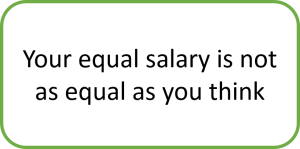 April 12th was National Equal Pay Day.
April 12th was National Equal Pay Day.
On April 11th, Microsoft posted a blog that indicated salary equity across gender and race. I applaud Microsoft and other organizations that publish their salary data. This transparency is a great first step.
It would be tempting to conclude from the information provided that there is pay equity and move on. However, salary data is not the whole story and it does not mean that there is actual pay equity.
Let’s look at the statements published on Microsoft’s blog:
“99.8 cents earned by women for every $1 earned by men with the same job title and level in the U.S.” and “$1.00 earned by racial/ethnic minorities for every $1 earned by Caucasian employees with the same job title and level in the U.S.”.
The key words are “same job title and level.”
In many organizations people can have the same job title and the same job responsibilities, but be in different pay levels. As a fictitious example, let’s take the title “Project Manager”. This is not the same as job ladders that start with Product Coordinator, move to Project Manager, then Senior Project Manager, Lead Project Manager, Project Director, and so forth. For the title Project Manager alone, there may be multiple pay bands – say level 15, 16 and 17, with the higher levels earning larger salaries and potential bonuses.
This is the first area where pay equity breaks down quickly. Let’s look at three fictitious employees:
- Employee A is a white man in pay level 17 with a salary of $80,000
- Employee B is a white woman in pay level 16 with a salary of $70,000
- Employee C is a black man in pay level 15 with a salary of $60,000
All three of these employees may be performing the exact same job duties, but Employee A has a higher salary and may also have a larger bonus, raise, and other compensation awards.
If it seems confusing how employees performing the exact same job may be in different pay levels, here is an example that is parallel to how many organizations function: consider a company that manufactures printer paper. In a team of Project Managers, Employee A is responsible for paper with recycled content, Employee B is responsible for premium paper, and Employee C is responsible for multi-colored printer paper. They all have the same day-to-day job duties and their performance can be measured in the same ways.
Employers can justify employees doing the same jobs at different pay levels by claiming differences in work experience or subjective differences in skills.
Compiling data to determine salary equity by job role vs. level is straightforward. An employer only needs to compare the data for each job title at each pay level. What is the race/ethnicity and gender breakdown for each? Let’s say there are 300 employees in each of the Project Manager pay levels from the example above. If there are 25 women in level 17 and 250 women in level 15 – you don’t have pay equity.
Bonuses and awards are another area where compensation inequity exists. People performing the same job, whether in the same salary level or not, often receive different compensation in the form of cash awards, stock awards or options, and non-cash awards such as trips and gifts of products or services.
Raises and promotions can also be inequitable. Are employees of all genders and ethnicities receiving the same percentage of salary increases? Are they promoted with the same frequency?
Publishing salary data is a critical first step. Now let’s see companies publish the gender and race/ethnicity data for:
- The same job titles at different pay levels
- The dollar value of bonuses and awards
- Raises and promotion frequency
When this data is published then it will be clear if an organization has pay equity or not. Until then, let’s remember that the salary data by pay level is only one compensation metric and it is not the whole truth.
Your Performance Review Isn’t Fair
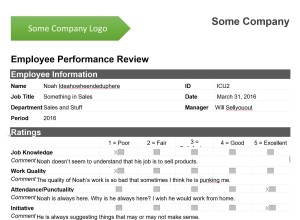 Your performance review is not about how well you served your customers, increased profits, reduced costs, expanded the business, or improved employee morale.
Your performance review is not about how well you served your customers, increased profits, reduced costs, expanded the business, or improved employee morale.
Your performance review is not fair whether it is positive or negative, whether you want to believe it is 100% true or 100% false, and whether you like or loathe your manager.
Your performance review reflects how well you served the department’s objectives.
Perhaps the objectives are clearly defined and understood. Book X amount of sales in new business; Y amount in renewals. Seems non-subjective. What’s the problem?
So many.
So many problems.
For example:
1) Employee A exceeds the sales goals. She should get an excellent review, no? But she doesn’t, because the review process allows for subjective feedback in addition to the objective numbers, and her manager writes in her review that she is not a team player, has low long-term prospects to grow in the company, and lacks initiative.
2) Employee B does not meet the sales goals. He should get a below average review, yes? No, he gets a glowing review. His manager notes in his review that there were unusual circumstances that prevented him from achieving the goals. The economy slowed sales. And, this employee is a positive contributor to the team and deserves an above average review.
3) Employee C does not meet the sales goals. He notes in his self-evaluation that his top customer was restructuring and unexpectedly froze large purchases for the current year. However, he proposed a set of products that would help the customer save significant costs through efficiency, and the customer committed to a purchase that would set a new record in next quota period, plus sustain sales for years to come. So this employee missed his current year goals in order to do the right thing for the customer and for his employer in future years. He should get a great review for doing the right thing for the business, right? No. His manager gave him a poor performance review for not meeting current goals.
These employees are just as likely to report to the same manager as they are to three different managers in the same department, or different managers in different parts of the company.
Disconnect your self-image and self-worth from what your manager writes on your performance review. That document might matter in terms of the bonus or raise you get, or whether you get promoted or are being pushed to leave the organization. However, it isn’t fair, so don’t let it mean more to you than what it is: a tool in the game you signed up for when you accepted this job.
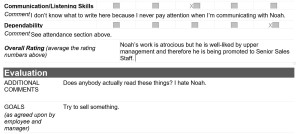
Remembering What Was Good About A Bad Job
 Last weekend I spent time with a friend that I met when I was at a not-so-favorite job. Let’s just say that particular job had many challenges. And not the exhilarating kind that lead to career success and personal fulfillment.
Last weekend I spent time with a friend that I met when I was at a not-so-favorite job. Let’s just say that particular job had many challenges. And not the exhilarating kind that lead to career success and personal fulfillment.
I hadn’t seen this friend in a long time and it popped into my head that her friendship was one of the best things I got from that job. We had a lot of fun while we helped each other cope.
That made me want to remember the other positive outcomes that came from a difficult work experience. Here are a few:
- I am passionate about the projects I managed and am proud of what I accomplished.
- I got to explore two specific types of marketing that I was less familiar with. I built solid skills in those areas that gave me the necessary qualifications for future work.
- I formed friendships and trusted relationships with colleagues that are still important to me.
These benefits are obvious to me, and I acknowledge them when they impact me. When I thought about it more I realized there are less obvious and more personal benefits:
- I learned what my boundaries are and sharpened the line between what I am and am not willing to do to succeed in business.
- I finally accepted that business isn’t always fair. Accepting this killed some of my idealism. However, it affirmed the type of businessperson I am and made it easier to detach from the fairness of an outcome that is not in my control.
- I changed my definition of success. Climbing the corporate ladder is only one way of evaluating success. There are many different ways to be successful in business – not to mention in life.
It takes time to recover after leaving a negative job, just as it does when leaving any significant relationship that was painful. If you’re recently out of a tough work situation I hope that you allow yourself to be angry about what wasn’t right and grieve for the hopes you had for that role.
Eventually, I hope you will also remember what you gained.

How To Tell If You Have A Cat And Other Business Problems
 I have a problem. I’ve been experiencing unusual symptoms and can’t tell if I have a cat or not.
I have a problem. I’ve been experiencing unusual symptoms and can’t tell if I have a cat or not.
You’re probably thinking “Seriously, how can you not know if you have a cat.” Let me remind you that a 47 year old woman recently gave birth one hour after realizing she was pregnant. Sometimes it’s hard to tell these things.
Today I met with a trusted advisor to see if she could help me determine if I have a cat or not. She had a series of questions about my symptoms:
Advisor: Is there is a cat in your house?
Me: Well, I can’t say for sure. I saw a cat on the stairs yesterday but haven’t seen one yet today. Sometimes they hide or sleep in weird places, so there might be a cat in the house. Or not.
Advisor: Are you feeding a cat?
Me: This seems black and white, but it isn’t that simple. I put out food and then when I check the dishes later, they are less full, but I haven’t actually witnessed a cat eating food. Maybe the food evaporates. Or a raccoon sneaks in and eats it. I saw the tail end of something that looked like a raccoon on my bed.
Advisor: Let’s backup. When did you first notice that you might have a cat?
Me: OK, I can answer this one. My neighbor was going out of town and asked if I’d like to watch her cat at my house. One of her other two cats picks on this one. So she brought the cat over with some food and litter and when she let her out of the carrier, she promptly ran and hid under a chair (the cat, not my neighbor). This was about two weeks ago.
Advisor: Great. So we know there has been a cat at your house recently. Now we just have to determine if you have a cat. Cat owners name their cats. What is her name?
Me: <sigh> This is another question that is tough to answer. My neighbor told me that the cat’s name was Stripes when she adopted it from another family. I have a hard time pronouncing that word…it gets tangled up in my mouth. She’s not really my cat, I think, so it doesn’t seem right to rename her. For now I’ve been referring to her as “She who shall not be named”. I did catch myself thinking of cat names, though.
Advisor: I see. Did your neighbor return home?
Me: I think so, but I haven’t actually seen her. I didn’t hear from her on the day that she was supposed to return, so I sent her an email and asked if she needed me to watch the cat for a while longer. She said that would be helpful.
Advisor: Hmm, that is vague. Let’s try a rapid-response technique. Just say the first answer that comes to mind. Ready? Cat hair!
Me: Everywhere!
Advisor: Vomit!
Me: None, thank God!
Advisor: Litterbox!
Me: Yes!
Advisor: Meow!
Me: Meow!
Advisor: Did you really just meow back at me?
Me: <defensively> You said to say the first thing that came to mind!
Advisor: I think you should give it more time to see if it clears up on its own.
And that is how we ended the conversation.
I still don’t know if I have a cat. But I know I love metaphors, so here’s one: Sometimes at work something is obvious to a few people and the rest just don’t get it.
For example, rumors of pending layoffs are percolating and several people ramp up their networking while the rest are shocked and unprepared when they are let go. Or a new vice president takes over a division and some people pay extra attention to the direction the wind is blowing. The others are surprised and dismayed when groups are reorganized, budgets are reallocated and projects are reprioritized.
It’s almost as if a few people have their eyes open and the rest are wearing dark glasses. I recommend keeping your eyes open. You’ll be better prepared for change and have an advantage over your coworkers who aren’t paying attention.
Some people naturally absorb many details around them and don’t get bogged down by what is right in front of them. If that is part of your personality already then take advantage of it! Practice putting it to use by listening to hallway conversations instead of tuning them out. When senior leaders are talking, don’t take their words at face value. How are they delivering their messages – vaguely, talking around issues, or over-emphasizing that people should “stay focused on their work”?
If observing everything is not natural to you but you want to be highly regarded and get promoted, then you can approach this by being politically savvy. Don’t worry about paying attention to everything. Instead, pay a lot of attention to what senior management is doing.
Who are they meeting with and how frequently? What projects are they most interested in? Is there a change in their usual routines? Make sure you greet them and ask what they’re focused on these days, and if there’s anything you can do to help. You can piece together a lot of information with these tactics.
Don’t be a weirdo hanger-on or an over-eager, desperate wannabe. We know those people and despise them, right?
Be natural and nonchalant while you are being curious and observant. Then maybe you’ll be quick to realize when the business is shifting and be able to make your choices proactively.
As for me, I’m going to buy some kitty litter. I want to be prepared in case I have a cat.
Damage Control at Work
 Some of my worst moments at work were when I pissed somebody off. Fortunately, I can only remember a handful of times when someone was really angry with me. And even more fortunately, I learned early on in my career how to do damage control.
Some of my worst moments at work were when I pissed somebody off. Fortunately, I can only remember a handful of times when someone was really angry with me. And even more fortunately, I learned early on in my career how to do damage control.
I took a 12 week Dale Carnegie course that changed my life for the better in many ways, and learning to recover when someone became angry with me at work is one of them. I recommend the course to anyone who wants to improve at public speaking, human relations and leadership. But if you just want me to get to the point about damage control, here it is:
Say that you were wrong.
Or the way Dale Carnegie states it in his Principles from How to Win Friends and Influence People: “If you are wrong, admit it quickly and emphatically.”
I had just learned about this principle when I managed to piss off an entire team of people that I was working with at the time. Upper management had decided that I would take over a program that they had been responsible for and I jumped in without discussing the change with them.
When the situation blew up, I felt terrible. I should have scheduled a meeting with them and positioned the change as a way to alleviate some of their  workload. Instead, it came across as if I was stealing their project without considering what they wanted.
workload. Instead, it came across as if I was stealing their project without considering what they wanted.
I immediately went to each person and apologized, said that I was wrong, and asked if we could have a meeting to make a group decision about how to manage the program in the future.
I remember those conversations very clearly. They all responded to me graciously and thanked me for approaching them. Sincerely acknowledging that I was wrong made me vulnerable and was disarming. I didn’t bring defensiveness or justifications to the conversations so there were no battles.
The nervousness that I felt when I knocked on their office doors was much less painful than the remorse and anxiety of upsetting them and making a mistake that could have damaged my career. By doing immediate damage control, my career wasn’t damaged at all. In fact, those team members had more respect for me than they did before; our working relationships improved.
That experience made a deep impression on me. I’ve only made a few fury-inducing work mistakes since then and am grateful I that I know how to manage them.
How to Survive a Horrible Boss
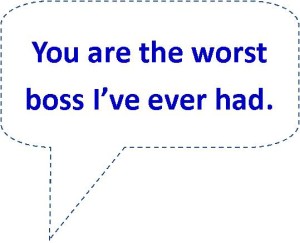 Unfortunately, most of us will report to a boss that we hate at least once in our working lives. If it is just once, consider yourself lucky. I have a friend who has reported to five complete jerks and only two normal people in 15 years. It has been so tough on her that whenever she leaves one jerk behind to take a new role, I’m scared that the new boss will turn out to be just as jerky as the last.
Unfortunately, most of us will report to a boss that we hate at least once in our working lives. If it is just once, consider yourself lucky. I have a friend who has reported to five complete jerks and only two normal people in 15 years. It has been so tough on her that whenever she leaves one jerk behind to take a new role, I’m scared that the new boss will turn out to be just as jerky as the last.
A horrible boss can take many forms. She might yell at you or humiliate you. He might take credit for your work and blame you for his mistakes. She could try to sabotage your career out of spite. He could constantly change the direction of your projects, favor your teammates while disparaging you to others, threaten to fire you, or otherwise bully or harass you. Do any of these characteristics remind you of someone you’ve reported to?
The good news is that if you are stuck with a lousy manager, there are coping mechanisms that you can use until you or the creep move on.
One: Make friends with your boss’s peers. This is a strategic maneuver. If your boss’s peer group respects and likes you, then your boss has more to lose by treating you poorly. For example, if you provide information, resources, or anything else of value to another team within your department and you do it well, that team will not want you to get fired or quit in frustration. Get to know the managers of these groups. Show interest in them. Ask how you can provide additional value.
If the people in these teams don’t provide positive feedback to your manager on their own and you have an ally you can trust, ask that person to send an email touting your contribution. If you are visible in the department as someone whom other teams respect and depend on, your manager may grudgingly treat you better.
Two: Make friends with your boss’s boss. As with your boss’s peer group, being visible to your boss’s boss is essential. This person must know your name and recognize you when he or she sees you. If your work culture supports “skip-level” meetings, take advantage of it. Find out what this person cares about, worries about and what the goals are for his or her area of responsibility. Then think of smart questions to ask that will be easy for that person to answer. Ask about factors that contributed to recent successes. Treat the person like a respected mentor – say that you want to excel in your role and ask how he or she achieved career growth.
When you pass your boss’s boss in the halls, say hello and add any personal comment that is appropriate. If he or she has only recently met you, start off with, “Hi Cheryl, it was great to meet you the other day. I’m Joe Smith on Roger’s team. Thanks for the advice on the XYZ.”
Be natural and genuine, not smarmy!
Then when it is time for your boss to get approval for who to gives promotions or bonuses to, or how individuals are rated in performance reviews, your odds of having a favorable outcome are significantly increased than if you are completely unknown.
Three: Document your work and email it to your boss. Figure out a schedule that is not obnoxiously often and not so far apart that it is forgettable. Maybe every Friday, or once every two weeks. Keep it short so you don’t waste time and so that it has a better chance of being read. Even if it isn’t read, it is a record of your performance that you can bring up in meetings with your manager. This exercise is to cover your ass, so make sure your boss can’t use the excuse that your emails got lost in her inbox.
A good format is to make the subject line “Joe Smith’s Project Update, October 2, 2015″, then make a bullet list of three to six in-progress or completed projects. Use as much hard data as you can to support results. Examples:
- Closed $128K in hardware sales last week, and am at 102% of my quarterly quota.
- Delivered the Safety Training to 56 client teams year-to-date. The pass-rate is 92% vs. the goal of 90%, and satisfaction survey results are 95% vs. the goal of 90%. Satisfaction is currently 10% higher than last year.
- Delivered the ABC parts to XYZ customer on October 1, 2015, four days ahead of the due date. Received a thank you email from XYZ’s purchasing manager, Jane Smith.
Four: Document your boss’s poor behavior towards you. In any crappy work situation, documentation is critical. Many public and private sector organizations require managers or the Human Resources department to create a paper trail of documentation before they fire an employee to cover their tracks in case of a complaint or lawsuit.
Turn the tables and create your own documentation about how your manager treats you. Think of it as insurance in case you need to use it to protect your reputation. Document dates, verbatim quotes, witnesses and how the action violated the employee handbook (if applicable).
Your record of events may protect you if the situation gets worse. If your boss violates company policy towards you, maybe she has done the same to other people. Someone may have raised complaints in the past. If you decide to speak up or find yourself defending your integrity, your notes are likely to impact the outcome.
If you are fired, you might be able to use the documentation to get unemployment benefits. I know people in multiple states who have done this!
Or, you might choose to never disclose your notes. If so, it wasn’t a wasted effort. The act of documenting your reality is cathartic and can prevent you from feeling like you are the crazy one. Bad managers often specialize in lowering employees’ self-esteem and making them feel like failures. Don’t let them have that power over you.
Five: Remember that your manager doesn’t own you. I deliberately avoided using the terminology for a manager as someone “you work for.” You actually work for the organization – your manager is just the person you report to. I don’t even like the word “boss”…because you are the boss of your life and that person is only charged with the responsibility to manage you as an employee.
Your work is one part of your life, not your whole life. Don’t let your manager “follow you home” and ruin your weekends. Make that person as insignificant in your life as possible by focusing on what you do have influence over (see numbers 1 – 4!).
If you are currently dealing with a horrible manager, I hope you will have a new manager soon! Refresh your resume and LinkedIn profile. Get testimonials about your performance if possible (see numbers 1 and 2!). Save copies of your achievements and kudo’s from coworkers or customers (see number 3!). Brush up on any important skills and stay on top of current trends and technologies in your field.
And until then, I hope these tactics help you survive.
A Tribute to Live Your Legend’s Scott Dinsmore
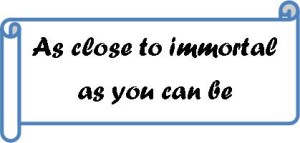 When I received an email from a friend letting me know that Scott Dinsmore died in a climbing accident, I was in disbelief. I receive his Live Your Legend email newsletters and had been tracking his yearlong journey around the world. He and his wife had been meeting with local Live Your Legend groups and were taking a break to climb Mt. Kilimanjaro. I had just read his newsletter describing his struggle to give himself permission to take a break from work to go on this climbing adventure.
When I received an email from a friend letting me know that Scott Dinsmore died in a climbing accident, I was in disbelief. I receive his Live Your Legend email newsletters and had been tracking his yearlong journey around the world. He and his wife had been meeting with local Live Your Legend groups and were taking a break to climb Mt. Kilimanjaro. I had just read his newsletter describing his struggle to give himself permission to take a break from work to go on this climbing adventure.
Scott was young and had accomplished more than most people will in their lifetimes. He gave a wildly successful TEDx talk and created courses and materials that reached people across the globe. It is sad to think of how much more he could have done to change people’s lives, and how much more he had to experience in his own.
What made the news difficult for me to believe was that Scott had a huge persona and had impacted so many people that he seemed immortal. I thought about his work and his passion and couldn’t imagine that he is no longer writing, creating and posting pictures of himself looking straight into the camera with a wide, genuine smile.
In the past few days I’ve been reading messages posted by his friends and followers on a Facebook page that was created to pay respects to him and his family. The messages were sincere and heartfelt. People who met him in person considered him a friend and those who knew him virtually also expressed personal feelings of warmth and gratitude for what they learned from him.
For me, Scott both inspired and in some small ways irritated me! He was relentless in his pursuit of living a meaningful life and I deeply admire that. He bravely quit a job that wasn’t aligned to his values to create a business that he enjoyed and benefited others’ lives. In my much smaller way, I strive to do the same.
Where we differed was that he seemed to have boundless energy for exploring, meeting and interacting with people, and he comfortably lived out of a backpack while soaking in the stimulation of new experiences. I just…don’t. While I enjoy people and adventures, I need a lot of alone time as a counter-balance. The thought of interacting face-to-face with as many people as Scott met with open arms and focused attention makes me feel frazzled. I’m a firm believer in resting and taking breaks when my body tells me I need it, and then push harder to achieve my goals when I’m restored. Feeling grounded and at peace with my life is more important to me than achieving traditional measures of success – like strong book sales when I’m finally published or growing my business rapidly.
I imagine if I had ever met Scott in person and described this, he would have listened to me with curiosity and said something like “You do you – it’s your legend to live!”
His TEDx video will live on YouTube for as long as any of those videos remain. His website and programs may continue in some form or not. It may not be immortality, but his impact on me and others will last a long time.
Scott, you lived with intention and showed us how it can be done. Thanks for the inspiration.
Speaking our truth at work
 On the surface, it seems like being honest at work should be the default. I mean…nobody wants to work with liars. Or think of themselves as liars! But people lie all the time at work, for many reasons.
On the surface, it seems like being honest at work should be the default. I mean…nobody wants to work with liars. Or think of themselves as liars! But people lie all the time at work, for many reasons.
At the top of the list is job survival. It is no secret that many managers want to hear that their strategy is intelligent, their plans make sense, the business is generating a positive return on investment, the employees are happy and think their bosses are smart and nice…and on and on, whether it is true or not. Even the managers that profess to want to hear the truth usually don’t, unless you can package the message in a way that puts any blame on someone else and keeps their egos intact.
Then there are the lies that make spending time with coworkers easier. He says, “Your presentation was great” and thinks to himself, “not so much. She says, “I think you’ll do fine in the annual review” when she has heard that the leadership team thinks that you make too many mistakes. He says, “No problem” to the coworker that missed his deadline, when really he is burning up with anger and resentment.
People also lie at work because telling the truth can be uncomfortable for everyone involved. A few days ago I was in a coffee shop and overheard a woman talking on the phone to someone who was either a peer or a staff person she oversees. She said something like, “I’m frustrated because when I’ve asked when you will deliver the report, you tell me you don’t know because you’re too busy.” Her tone of voice sounded exasperated but polite, and her volume was low. She continued to say, “I had to do a lot of extra work because I didn’t have the information I needed in your report. Will you set my expectation for when I will receive it?”
As I’m listening to her, I’m thinking “Good job! You’re expressing yourself honestly and asking for what you need, and you’re doing it in a respectful way.”
Then it got sad and ugly.
But not because she became angry or disrespectful.
It got sad and ugly because she started apologizing.
Apparently the person on the other end of the phone did not receive the message well. The coffee shop woman started saying “I’m sorry. I don’t mean to be rude.” And then spent the next ten minutes pacifying the person she was speaking with. When they finally hung up, I’m not sure she ever got an answer as to when the report was going to be delivered!
Boo.
She wasn’t being rude. She could have been a case study for how to communicate a difficult message to people at work until she backed down as soon as the other person got defensive.
It is often challenging to say the truth at work, especially when you’re pointing out a mistake or asking for something to change. But if you don’t say what you need, you are never going to get your damned report!
Let’s take a moment to reflect on what happens when we deny our truth:
- We make our authentic selves smaller
- We demean the part of ourselves that wants to live with integrity
- We reinforce the habit of denying our truth in order to make other people and ourselves more comfortable
It doesn’t have to be this way. I’ve been working on being truer to myself for several years, and as with anything, it gets easier with practice.
It also feels really good to think back on tough conversations and be proud of myself for communicating honestly instead of holding back out of fear or because I was worried I wouldn’t say exactly the right words. I reminded a friend who was planning to have a conversation with a woman who had disappointed her that “you can tell the truth without being an asshole!”
If you want to speak your truth more often, you might be interested in this: Martha Beck recently emailed a newsletter called “Speak Your Truth. No Matter What.” to promote her upcoming telecourse called The Integrity Cleanse.
This is not one of those times when I get a commission for referring people to products or services. I just love Martha Beck and credit her books and courses with helping me create a better life for myself. I would be thrilled if you also found value in her wisdom. Truth!
Maybe your life sucks because your job sucks
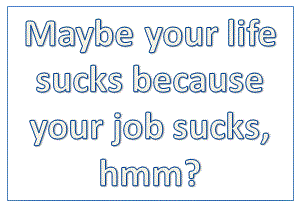 For the last two weeks I’ve been writing about how life can suck and then it gets better. Now I’m going to show you this really cool trick where you can take any topic that you’ve been writing about and connect it back to the main point of your blog, which in my case is about careers. Are you ready? Here goes:
For the last two weeks I’ve been writing about how life can suck and then it gets better. Now I’m going to show you this really cool trick where you can take any topic that you’ve been writing about and connect it back to the main point of your blog, which in my case is about careers. Are you ready? Here goes:
First of all, a lot of times our lives suck because our jobs suck, and those jobs almost never get better. When they improve, it is usually because your evil boss got fired, you moved to a new team or a new manager, or you got a big promotion that will make you happy for about two weeks. Usually it doesn’t get better, and that’s why I’m writing a book about quitting jobs, so you can go do something else that doesn’t suck.
This is true.
But there is an even deeper connection to how and why our lives suck when we’re in the wrong jobs. The reason is that when you are working in an environment that doesn’t support your authentic self and is not in alignment with your values, it is not the right job for you. No matter how much it pays, how important your title sounds, or how fancy your office is, if your job isn’t a part of living your “right life”, then it is not going to be pleasant.
You might love some parts of your job, and that can make it confusing. I sure adored the team of people I used to work with and was incredibly passionate about the program I was responsible for.
Our relationship to work is similar to any relationship, and there’s ups and downs, good and bad, and changes. It took me a long time to let go of my last full-time employee position because of the positive things about it. But once I realized that it wasn’t the right environment for me to be my truest self, I started planning my exit.
When I finally quit and began aligning my choices with my values, my life became magical. Really. I’ve written about it before, but it still amazes me how much easier and fun life was. Quitting my job had the biggest impact on my life, but along with that I made other changes to be truer to myself. I let go of some people that made me feel dragged down instead of uplifted. Instead of spending all my time working or sleeping, I pursued my interests in animal sanctuaries, started writing again, and looked for ways to tap into my creativity.
After quitting, there was a period of uncertainty and I wasn’t sure exactly what to do, so I just kept living day by day and sometimes hour by hour, making choices that felt like I was staying on track with my values. When things would start to go sideways, I would course-correct immediately. It wasn’t long before I found my way into my consulting business that I love, made deep and lasting friendships and was happier than I had ever been before.
Then, of course, there came the tough times and challenges. Living my “right life” didn’t prevent my beloved cat from getting sick and dying, it didn’t stop my family from having difficulties, and it sure didn’t block out the personal issues I’m facing now. Those things are still hard and hurt…you know, the life sucks part.
Yet I am coping with tough times so much better than I would have when I wasn’t living as close to my ideals. I have a better support system to help me now. I have many things to be grateful for, including my amazing work-life, many people I care about, and appreciation for living in such a beautiful part of the world. The magic is still there. It is just working in subtler, persistent ways.
I’m choosing to believe that part of the reason for my struggles is that there is an area of my life that needs to change. I don’t know exactly what steps I need to take, or what the outcome will be. I’m not even sure if it is an external life change or internal self-development. But I know, because I have experienced this before, that as long as I stay true to myself I’ll make the right decisions at the right time.
This faith gets me through the toughest moments.
Faith, gratitude, and my sense of humor. When times are really good or really rough, I like to name my moods and my outfits, act a little reckless while remaining completely safe, and make playlists. Stay tuned for the “when life sucks but actually everything is going to be ok” playlist, coming soon.


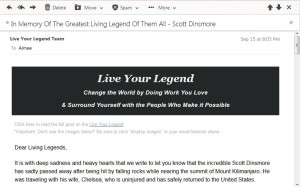

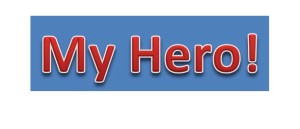

Recent Comments